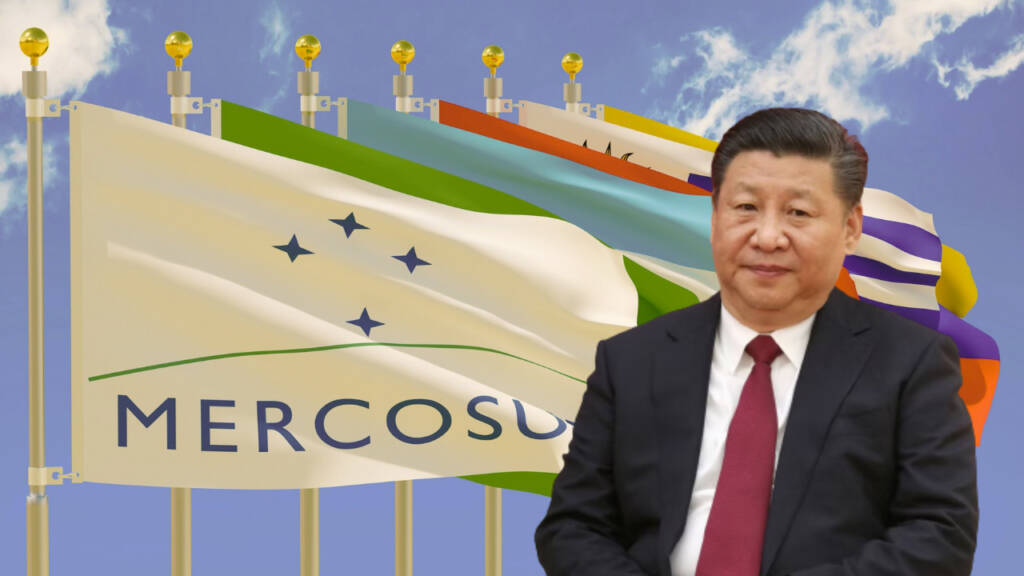Mercosur-China trade deal: Mercosur and China are getting cozy, leaving the EU out in the cold. Is this the start of a new love affair, or just a fling? Let’s find out.
The relationship between Mercosur (the Southern Common Market) and the European Union has been tumultuous for several years. For Mercosur, it has been more like a situation of unrequited love where the EU has been reluctant to return the favor of engagement.
However, recent developments suggest that Mercosur is finally moving on from the EU and looking towards China as a potential trade partner. This decision may be a wise one, given the current global geopolitical climate and the possible economic benefits for the region.
The visit of Uruguay’s Foreign Minister Francisco Bustillo to China this April, for instance, has marked a significant step towards cementing stronger bilateral ties between China and Mercosur. Bustillo’s visit came as China sought to strengthen its ties with South America, given the rising tensions between China and the United States. Bustillo hailed the decades-old relationship between Uruguay and China and expressed hope of deepening the partnership through a potential free-trade deal.
Bustillo’s visit comes after Brazilian President Luiz Inácio Lula da Silva’s trip to China. Lula has promised to strengthen Mercosur’s trade bloc as part of his efforts to restore Brazil’s global leadership role. He also expressed hope of closing the gap on a separate free-trade deal with China that might modernize and open up Mercosur to other regions.
The negotiations for a Uruguay-China FTA started last year, following a consensus reached in 2016 between Chinese President Xi Jinping and his then Uruguayan counterpart, Tabaré Vázquez. Mercosur prohibits member states from making trade deals with other countries without its consent. However, Paraguay still recognizes Taiwan’s sovereignty, which hinders the consolidation of an FTA between Beijing and Mercosur. But, that could change after elections this year.
ALSO READ: Taiwan and the West in trouble due to Paraguay’s general elections
Mercosur-China trade deal
Despite the hurdles, some experts believe that a bilateral FTA between Uruguay and Argentina with China could benefit South American countries, given their less-developed industry. It could also pave the way for a Mercosur-China trade deal eventually.
Karin Costa Vazquez, the executive director of the Centre for African, Latin American, and Caribbean Studies at O.P. Jindal Global University in India, believes that individual FTAs between Mercosur members and China could hurt Brazil’s industry.
Lula has urged Uruguay not to sign a separate FTA with China, arguing that it would undermine the Mercosur customs union. Instead, he has called for a discussion between Mercosur and China on a possible trade agreement. While the progress on the Uruguay free-trade deal is still constrained by the Mercosur mechanism, Uruguay could serve as a gateway for the bloc to eventually sign an FTA with China.
China may also take into consideration Brazil’s leadership role in Mercosur. Nevertheless, the two nations upgraded their ties during Lula’s visit, and there is hope for more trade facilitation, agricultural exports, and bilateral investments.
From a diplomatic standpoint, the shift towards China and away from the EU could be seen as a wise decision by Mercosur. Relations between Mercosur and the EU have been difficult for years due to disagreements over tariffs and trade policies, and the negotiation of a comprehensive free trade agreement has been ongoing for almost two decades without success. As a result, Mercosur has struggled to expand its global presence, and the current geopolitical climate has further complicated the situation.
ALSO READ: Age old bullying in Mercosur is pushing the continent towards stagnation
Moreover, the COVID-19 pandemic has accelerated the trend towards economic decoupling, with countries looking to diversify their supply chains and reduce their reliance on foreign imports. This has created an opportunity for China to deepen its economic ties with Latin American countries like Uruguay, which are rich in natural resources and agricultural products that are in high demand in China.
Overall, the decision by Mercosur countries like Uruguay to shift their focus towards China could be a positive development for the region. While it is important to maintain diplomatic and economic ties with traditional partners like the EU and the United States, it is also essential to explore new opportunities and partnerships that can help countries achieve their economic goals and reduce their dependence on any one partner. As the global balance of power continues to shift, it is essential for countries to be flexible and adaptable in their approach to diplomacy and trade.
https://www.youtube.com/watch?v=x_yeTvnzZL8
